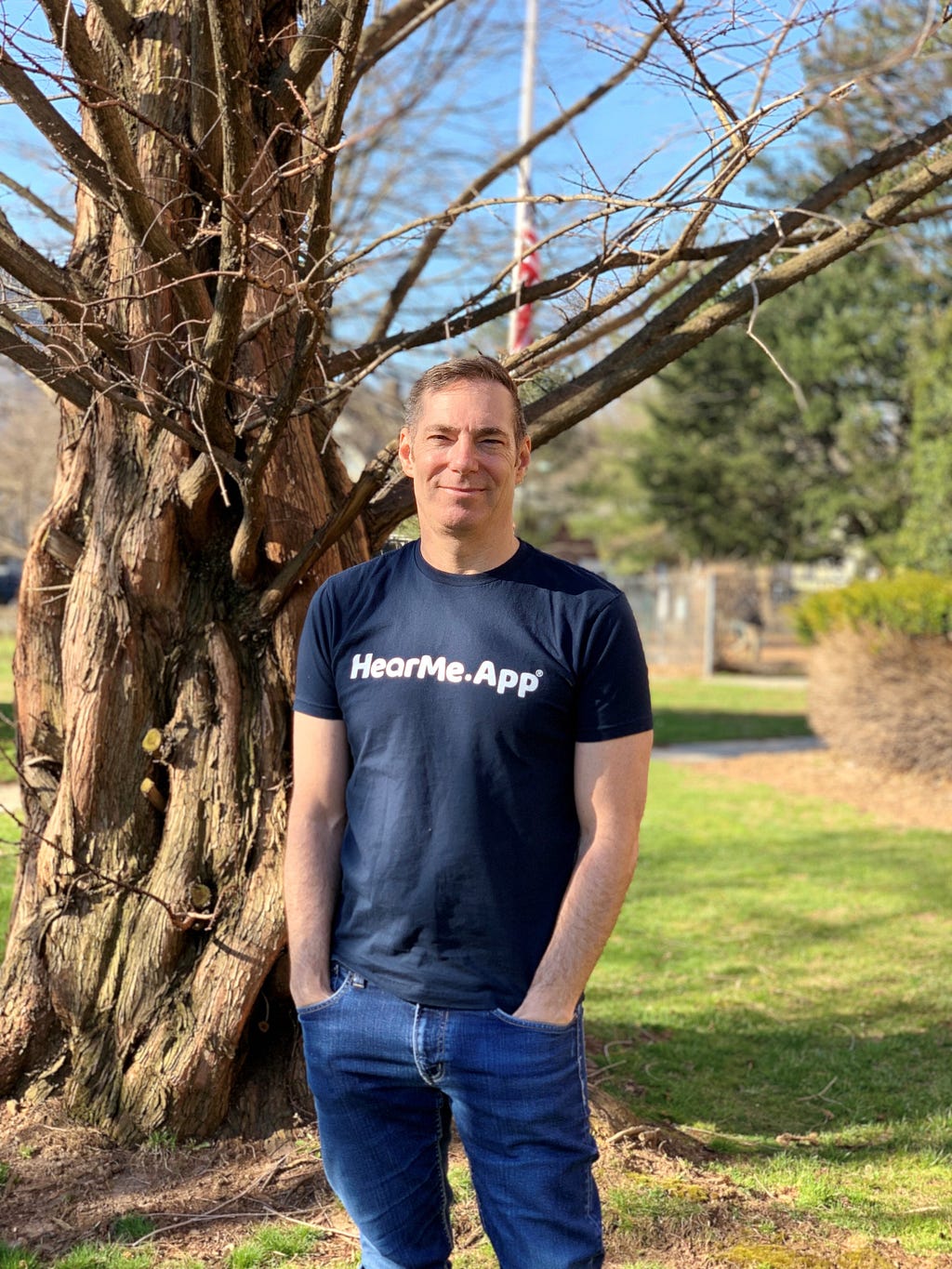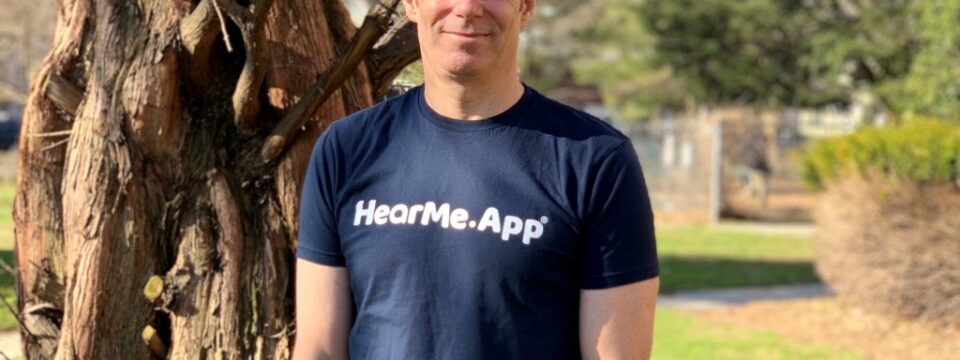
I meditate every day in the morning, take a walk, drink water, breathe and stretch. Breathing and stretching is a crucial way to check in with your body. When I’m feeling stressed or anxious this also helps. I have this technique where I just start very basic. I ask myself, “where are my feet?” I ask, “am I hungry? Angry? Lonely? Tired?”
As a part of our series about Mental Health Champions helping to promote mental wellness, I had the pleasure to interview Adam Lippin.
HearMe is an on-demand emotional wellness app that connects members to our trained volunteer listeners for instantaneous text chat, anytime and anywhere. With thousands of empathetic listeners across the globe, we help you find support, release stress, and feel better through one-on-one peer support.
Founded by Adam Lippin, HearMe is committed to using the power of listening to provide a safe space for people to share what’s on their mind with listeners who want to be there. During his teens and early 20s, our founder Adam Lippin struggled with addiction and loneliness. By sharing his experiences with others in his recovery, Adam learned about the benefits of peer support. These transformative experiences led Adam to create HearMe to make it possible for everyone to authentically connect with another human being and experience the benefits of being truly seen, heard and validated. With loneliness and mental health increasingly becoming a public health crisis, there’s never been a more important time for people to find the support they need.
Thank you so much for doing this with us! Before we dig in, our readers would like to get to know you a bit. Can you tell us a bit about how you grew up?
I grew up in Ossining, New York in a working-class family. I have two older sisters and my mom was always working. At a very young age, I was already quite contemplative. I had ADHD– back then they called it ‘hyperactive’ and went to speech pathology classes to work on my lisp. It made me feel even more removed and less connected like I needed to be fixed. Through all of my early childhood struggles, it did spark this empathy inside me that made me think, that maybe one day I could help other people feel less alone.
You are currently leading a social impact organization that is helping to promote mental wellness. Can you tell us a bit about what you or your organization are trying to address?
Our mission is to provide a solution to the three main pain points in mental health: accessibility, affordability, and immediacy. HearMe is a free emotional wellness app that connects people to trained and caring volunteer listeners for real-time chat, anytime and anywhere. Our unique approach to peer support is ensuring that our users are paired with listeners with shared life experiences. So if you’re a nurse, you’ll be paired with a nurse who’s trained to listen and support you. Regardless of gender identity, culture, race, age, profession, life stage, or status, the algorithm makes these matches so users can share what they’re going through in a safe space without judgment. Research shows that peer-to-peer support can improve people’s well-being, resulting in fewer hospital stays, higher self-esteem, more confidence, and improved social skills. A recent study by Penn State and Stanford showed a 57% increase in mood after a single conversation with a HearMe listener.
Can you tell us the backstory about what inspired you to originally feel passionate about this cause?
I had a deep recognition of internal loneliness very early on. Being gay also just infused so much of that loneliness. I did everything to try to feel better, including filling myself with drugs and alcohol. Then I discovered the book, I and Thou by Martin Buber. One of the major themes of the book is that human life finds its meaningfulness in relationships and connection. This idea of shifting from “the little I” to “the big I” where all of us are connected. This also led me to AA, where the core foundation is listening to each other, and offering support and connection. I started HearMe as a means to connect us all to the power within us, by simply being heard and seen. So many of us are lonely and don’t always have someone to talk to and receive validation for who we are. HearMe bridges the gap between individuals and the outside world, and reminds you, that you are not alone. I am listening, and I see you.
Many of us have ideas, dreams, and passions, but never manifest them. They don’t get up and just do it. But you did. Was there an “Aha Moment” that made you decide that you were going to step up and do it? What was that final trigger?
I started working for myself at 25 and became successful with my restaurant business. The “aha moment” for me was realizing that while I had much success as an entrepreneur, I wasn’t aligned with the work spiritually and mentally. I still had this innate desire in me to help people create space to form connections and be of service to the millions of people in the world who experience loneliness. I wanted my vocation to be aligned with my passion to create good in the world. It wasn’t until I turned 50 that I began actualizing what I wanted to do with my life. I sold my restaurant business and started Cuddlist. It was through that app (based on connecting people safely for physical touch), that I began to see the impact I could have on making people feel less lonely. HearMe was born out of this same desire to connect with people, and it was my experience in AA that showed me how important peer support is for our mental health.
Can you share the most interesting story that happened to you since you began leading your company?
Because of HearMe, everyone I talk to feels permission to open up to me and share their stories. This never happened when I ran a restaurant chain! Creating this platform has allowed me to be even more connected to people than ever before.
None of us can be successful without some help along the way. Did you have mentors or cheerleaders who helped you to succeed? Can you tell us a story about their influence?
Well, of course, Martin Buber from afar as I mentioned how his book changed my life. But to be quite honest, it wasn’t until I started HearMe that I began to have investor interest, or cheerleaders coming together to support the cause. I realized one day that I didn’t have anyone to call when I was going through something or wanted to celebrate a win. HearMe was also inspired by giving people someone to connect with when they don’t have anyone, and in turn, opened my world up in new ways. That being said, when I met my now-husband at 35, I found a partnership and a love that kept me going. And now we get to raise a beautiful son together.
According to Mental Health America’s report, over 44 million Americans have a mental health condition. Yet there’s still a stigma about mental illness. Can you share a few reasons you think this is so?
There’s been surface de-stigmatization surrounding mental health, but we aren’t socialized for it. Men are conditioned early on to suppress their feelings and aren’t taught to express them. In a primarily patriarchal society, that runs through society as a whole. Even employers don’t know how to truly handle it. You can be honest about your mental health in an interview and an employer may still question if they want to hire someone with depression or anxiety. As a gay man, internalized homophobia was something I grappled with for a long time. I thought if I expressed my loneliness and longing for a connection I would be seen as weak in society and business.
In your experience, what should a) individuals b) society, and c) the government do to better support people suffering from mental illness?
Every day people can listen to other people. If you want to be available for someone, doing something good for someone can also be self-care. As a society, be kinder to each other, and smile at someone. And when someone expresses their struggles– before you respond–just listen. We’re socialized to fix things that make us uncomfortable but truly all someone needs is to be seen and heard. By trying to tell someone a solution to their problems, what you’re really saying is “I’m done with you, I want this to go away.” When someone tries to fix you, they become an unsafe person, and it’s a sign of a non-intimate relationship. With the government, there have to be support systems that are funded, and universal health care should include mental health care.
What are the 5 strategies you use to promote your well-being and mental wellness? Can you please give a story or example for each?
I meditate every day in the morning, take a walk, drink water, breathe and stretch. Breathing and stretching is a crucial way to check in with your body. When I’m feeling stressed or anxious this also helps. I have this technique where I just start very basic. I ask myself, “where are my feet?” I ask, “am I hungry? Angry? Lonely? Tired?”
What are your favorite books, podcasts, or resources that inspire you to be a mental health champion?
The book I am Though by Martin Buber for spiritual context, and Together: The Healing Power of Human Connection in a Sometimes Lonely World, by the biggest champion for facing the loneliness epidemic, Dr. Vivek H. Murthy.
If you could tell other people one thing about why they should consider making a positive impact on our environment or society, like you, what would you tell them?
It will make you feel better. The more you try not to, the worse you’re going to feel. Want to feel better? Make others feel better.
How can our readers follow you online?
You can learn more about Hear Me by visiting @hearme_app on Instagram, and going to our website www.hearme.app. You can download the app on Google Play and at the Apple Store.
Thank you so much for joining us. This was very inspirational.
Mental Health Champions: Why & How Adam Lippin of HearMe App Is Helping To Champion Mental Wellness was originally published in Authority Magazine on Medium, where people are continuing the conversation by highlighting and responding to this story.
